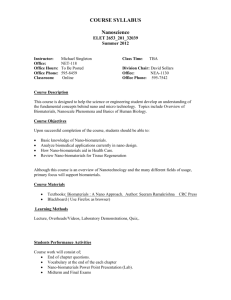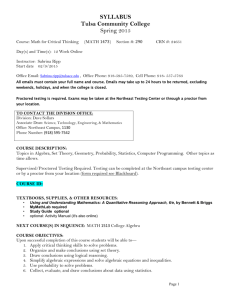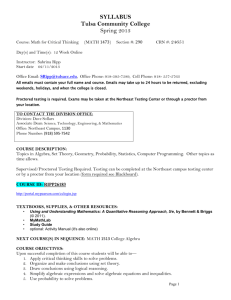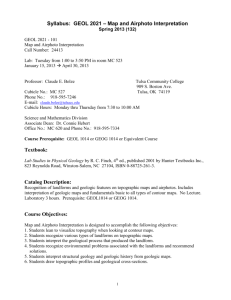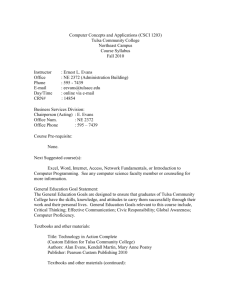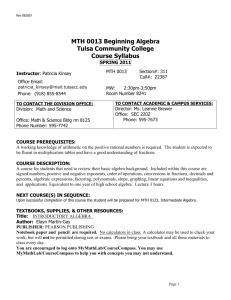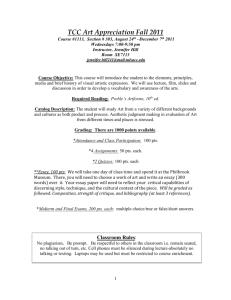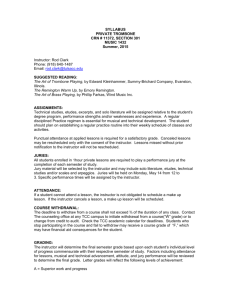ENGL_1213_409_14126_201510.doc
advertisement
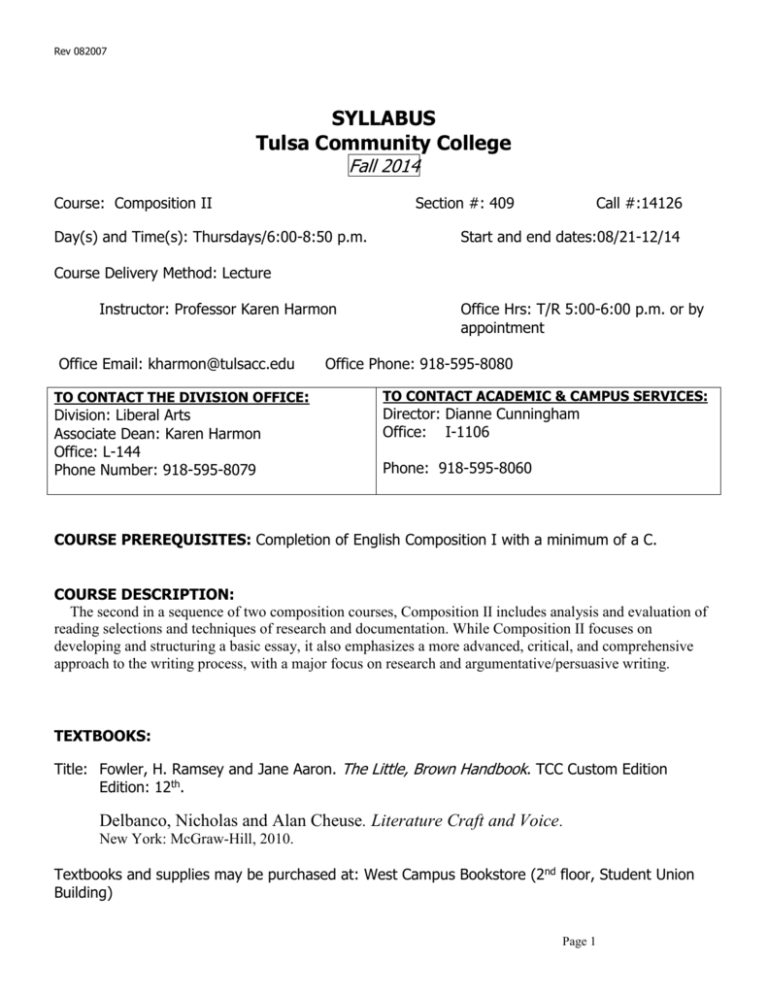
Rev 082007
SYLLABUS
Tulsa Community College
Fall 2014
Course: Composition II
Section #: 409
Day(s) and Time(s): Thursdays/6:00-8:50 p.m.
Call #:14126
Start and end dates:08/21-12/14
Course Delivery Method: Lecture
Instructor: Professor Karen Harmon
Office Email: kharmon@tulsacc.edu
Office Hrs: T/R 5:00-6:00 p.m. or by
appointment
Office Phone: 918-595-8080
TO CONTACT THE DIVISION OFFICE:
TO CONTACT ACADEMIC & CAMPUS SERVICES:
Division: Liberal Arts
Associate Dean: Karen Harmon
Office: L-144
Phone Number: 918-595-8079
Phone: 918-595-8060
Director: Dianne Cunningham
Office: I-1106
COURSE PREREQUISITES: Completion of English Composition I with a minimum of a C.
COURSE DESCRIPTION:
The second in a sequence of two composition courses, Composition II includes analysis and evaluation of
reading selections and techniques of research and documentation. While Composition II focuses on
developing and structuring a basic essay, it also emphasizes a more advanced, critical, and comprehensive
approach to the writing process, with a major focus on research and argumentative/persuasive writing.
TEXTBOOKS:
Title: Fowler, H. Ramsey and Jane Aaron. The Little, Brown Handbook. TCC Custom Edition
Edition: 12th.
Delbanco, Nicholas and Alan Cheuse. Literature Craft and Voice.
New York: McGraw-Hill, 2010.
Textbooks and supplies may be purchased at: West Campus Bookstore (2nd floor, Student Union
Building)
Page 1
Rev 082007
Supplies:
Journal
Portfolio
Pen/pencil
Jump Drive
Lined notebook paper
COURSE OBJECTIVES:
Upon successful completion of this course students will be able to—
Demonstrate the ability to use details from observation and research to support argument
and to build on the capacity to develop extended argument
Synthesize multiple sophisticated academic sources while maintaining one’s own thoughts
and ideas
Demonstrate critical reading skills
Demonstrate the ability to analyze written material by developing complex arguments and
analysis, sometimes mixing argumentative and analytical methods to produce coherent,
evidential papers for educated and academic readers
Move productively among the stages of a recursive writing process to prewrite, draft, peer
review, revise and edit college-level compositions with appropriate formatting, usage,
structure and style for an academic audience
Restrict a subject and define a clear purpose
Respond to ideas found in a variety of texts
Incorporate appropriate technology
Develop intelligent, evidence-based approaches to texts
TEACHING METHODS:
This is a composition course. That means writing. We will write every class period. Some
writings will consist of reader’s responses to material we’ve read. Some will be journal
writings and other informal writings. However, students should come to every class prepared
to write. Other teaching methods include discussion, impromptu writing, lecture and note
taking, readings both in and out of class, textbook discussions and discussions of outside
readings.
Page 2
Rev 082007
EVALUATION TECHNIQUES: TO INCLUDE QUIZZES, HOMEWORK POINTS, POINTS FOR
JOURNAL ENTRIES AND READER’S RESPONSES, THREE MAJOR PAPERS, PORTFOLIO GRADE,
AND PARTICIPATION POINTS.
GRADING SCALE: A=90-100, B=80-89, C=70-79, D=60-69, F=0-59
ATTENDANCE: Attendance is required. The participation grade can be impacted by attendance.
Excessive absences will result in the student being withdrawn from the class (Administrative
Withdrawal). The Administrative Withdrawal can affect financial aid, Veteran’s benefits and
scholarships.
LATE ASSIGNMENTS AND MAKE-UP WORK:
As a rule, late work is not accepted. Under documented extenuating circumstances, late
work may be accepted at the discretion of the professor with a reduction in points. The
student must turn late work in no later than the class period following their return. The same
policy applies to make-up work of any kind. (Example: Miss class Thursday, return the
following Thursday – clarify information in regard to work missed, due the next Thursday at
the beginning of class).
TARDIES: Habitual tardiness will be considered a behavior problem. Please plan your daily
routine so as to be on time.
CELL PHONES: Please turn cell phones off when you enter the classroom. Cell phone use
in class or leaving the room to answer cell phone calls is unacceptable. If there is a legitimate
reason to leave one’s cell phone on, the student should notify the professor before class starts.
10. Course Withdrawal: The deadline to withdraw from a course shall not exceed 3/4 the
duration of any class. Contact the Counseling Office at any TCC campus to initiate withdrawal
from a course ('W' grade) or to change from Credit to Audit. Check the TCC Academic Calendar
for deadlines. Students who stop participating in the course and fail to withdraw may receive a
course grade of “F,” which may have financial aid consequences for the student.
COMMUNICATIONS:
Email: All TCC students receive a designated “MyTCC” email address (ex:
jane_doe@mail.tulsacc.edu). All communications to you about TCC and course
assignments will be sent to your MyTCC email address; and you must use MyTCC email
to send email to, and receive email from, the instructor regarding this course.
Inclement Weather: TCC rarely closes. If extreme weather conditions or emergency
situations arise, TCC always gives cancellation notices to radio and television stations.
This information is also posted on the TCC website (www.tulsacc.edu).
Page 3
Rev 082007
GENERAL EDUCATION GOALS: General Education courses at TCC ensure that our graduates
gain skills, knowledge, and abilities that comprise a common foundation for their higher education
and a backdrop for their work and personal lives. TCC’s General Education goals are: Critical
Thinking, Effective Communication, Engaged Learning, and Technological Proficiency.
CLASSROOM ETIQUETTE: Open and mutually respectful communication of varied opinions,
beliefs, and perspectives during classroom or online discussion encourages the free exchange of
ideas that is essential to higher learning and to the ability to learn from each other. Use of any
electronic device is at the discretion of the instructor.
SYLLABUS CHANGES: Occasionally, changes to the syllabus may be necessary. Students will
be notified of any changes to the syllabus in writing.
STUDENTS WITH DISABILITIES: TCC provides accommodations for qualifying students in
compliance with the Americans with Disabilities Act. For information, students may contact the
disabled Student Resource Center, 918-595-7115, or the Resource Center for the Deaf and Hard of
Hearing, 918-595-7428V, 918-595-7434TTY.
ACADEMIC DISHONESTY: Academic dishonesty (cheating) is defined as the deception of
others about one’s own work or about the work of another. Academic dishonesty or misconduct is
not condoned or tolerated at campuses within the Tulsa Community College system. Tulsa
Community College adopts a policy delegating certain forms of authority for disciplinary action to
the faculty. Such disciplinary actions delegated to the faculty include, but are not limited to, the
dismissal of disrespectful or disorderly students from classes. In the case of academic dishonesty a
faculty member may:
Require the student to redo an assignment or test, or require the student to complete a
substitute assignment or test;
Record a "zero" for the assignment or test in question;
Recommend to the student that the student withdraw from the class, or administratively
withdraw the student from the class;
Record a grade of "F" for the student at the end of the semester. Faculty may request
that disciplinary action be taken against a student at the administrative level by
submitting such a request to the Dean of Student Services.
INSTITUTIONAL STATEMENT: Each student is responsible for being aware of the
information contained in the TCC Catalog, the TCC Student Policies & Resources Handbook,
Page 4
Rev 082007
and semester information listed in the class schedule. All information may be viewed on the
TCC website: www.tulsacc.edu
TENTATIVE COURSE CALENDAR:
Week 1: Unit Theme: Family Ties/Relationships (Thinking out loud)
Review of syllabus
Discussion: Portfolio
Discussion of Writing Process
In class reading assignment: Sex, Lies and Conversation (Deborah Tannen)
Journal #1
Outside reading: Little Brown Handbook, pp. 78 (Writing Portfolio)
Week 2:
Discussion (Tannen)
Reader’s Response #1: (Tannen)
Writing Process in use:
(Pre-writing)
Brainstorming ideas
Developing a thesis
Focus on main and supporting ideas
(Drafting)
Journal #2
Reading Assignment: Little Brown Handbook, pp. 14 – 19
Week 3:
Discussion: Can you really ever know another person?
Reading (in class) The Story of an Hour (Kate Chopin)
Reading (in class) Those Winter Sundays (Robert Hayden)
Reader’s Response #2
Discussion
Focus on revision/paraphrasing thoughts and ideas and incorporating quotes
MLA (handout with sample)
Revision due next class period
Reading Assignment: Little Brown Handbook, pp. 54-58
Page 5
Rev 082007
Week 4:
Turn in revision
Peer Review
In class reading: The Chrysanthemums (John Steinbeck)
Discussion
Reader’s Response #3
Journal #3
Week 5: Unit Theme: Media and Society (Using definitions to clarify writing)
In class reading: Does Social Networking Really Connect You to Humanity? (Dave
Taylor)
Discussion
Reader’s Response #4
In class reading: The Fakebook Generation (Alice Mathias)
Discussion
Reader’s Response#5
Reading Assignment: Little Brown Handbook, pp, 186-196
Week 6:
In class reading: What Do Adolescents Miss When We Let Them Grow Up in Cyber
Space? (Brent Staples)
Discussion
Reader’s Response #6
Writing Argument (courtroom)
Reading Assignment: Little Brown Handbook, pp. 213-219
Week 7:
Presenting Argument
Week 8:
Presenting Argument
PAPER #1 DUE (end of presentations)
Mid-term based on readings
Week 9:WRITING ACROSS THE CURRICULUM - Unit Theme: The American
Dream (Ethical appeals to establish credibility)
In class reading: I Have a Dream (Dr. Martin Luther King Jr.)
Discussion: Define the term, “American Dream”
In class reading: On Dumpster Diving (Lara Eighner)
In class reading: Becoming American (Dinesh D’Souza)
Reader’s Response #7
Page 6
Rev 082007
Reading Assignment: Little Brown Handbook, pp. 223-224
Week 10: Historical Readings
The American Journey: A History of the U.S. pp. 144-145, 147
The Declaration of Independence
Discussion
Reader’s Response #8
Week 11: Historical Readings
The American Journey – The Indian Removal – pp.258-263
The American Journey – Slave Life and Culture – pp. 290-293
The American Journey – Religious Arguments – pp. 301
The American Journey - Women’s Rights – pp. 334-335
Discussion
Reader’s Response #9-12
Week 12: Pulling It All Together – Making Choices – Research/Argument
Discussion:
A. Thesis
B. Main Ideas
C. Supporting Ideas
D. Quotes
E. Paraphrasing
F. Documentation (MLA)
Week 13:
Rough Drafts
Conferencing
Week 14:
Revisions
Peer Editing
Week 15:
Computer Lab
Individual conferencing
Week 16:
Final Conferences
Papers Due
Final Exam (comprehensive)
Page 7

